|
I want to know what love is. There’s a place within me where sun grasses grow from damp wood, a small pocket of sunlight at the bottom of a marsh. I wander through sticky things, fluffy things floating around me in the heavy heat—dandelion seedlings, spider web threads, translucent wings flashing indigo, and monarchs fluttering low to the ground in search of fruity milkweed. But there’s also nightcrawlers burnt to a crisp. And poison hemlock clutching the shadows. And goldenrod being choked out by the guard rail. I step around smashed glass on the side of the road glinting like emeralds. I almost want to touch it, lick away the blood. The muggy air becomes laced with exhaust from a passing truck that pulls over to the side of this hometown road. The wind picks up. The air turns cooler. And a dark storm cloud inches its way across the sun, blotting out the heat, however briefly. I eye the truck, lingering by the curb. All I know is what love is not: a black snake, up ahead, coiled in silence.  Jenn Powers is a writer and artist born and raised in the woodsy hills of northeastern Connecticut. Her fields of study are creative writing, Gothic literature, and nature/environmental writing. She's a self-taught visual artist and photographer, which she's been involved with since she was a child in the '80s and '90s. Her work has been anthologized with Kasva Press (Israel), Running Wild Press (Los Angeles), and Scribes Valley Publishing (Tennessee), and has been nominated for the Pushcart Prize, Best of the Net, and Best Small Fictions.
0 Comments
I’m out walking and crying for my friend’s loss and about how hard it was for her to watch her sister slowly disappear, and how the last time I saw my friend, when we had dinner in New York with industrial chic tables and large glasses of wine, she said, we treat animals better than we treat the dying, and all I think about is death: when I wake up, when I fall asleep, when I’m working, and I know what she means and I cry for myself and for all the losses around me, and the people driving by must wonder what’s wrong with me, if they look up from their own problems—and why should they?—and I turn into Lakota Oaks, the conference center that’s going to be a school but used to be a monastery, and you can see the monks’ graveyard at the top of the hill from the long beautiful pond around which I now walk the remaining stations of the cross, an unbeliever amidst the incomprehensible universe, and I think: the universe is big enough to hold my grief without getting hurt itself. I don’t have to carry it all, and the man who was running the trail in the opposite direction passes me again, saying, beautiful day, and it almost is.
 Photo by Sacha Verheij on Unsplash Photo by Sacha Verheij on Unsplash You turn away from the screen. You half-shrug. Time for a cliché to cut the tension, guaranteed to make everyone grunt and shake their heads in pseudo-profound melancholy. This has happened before, you begin, it will happen again. Suddenly she’s shaking your arm, yelling at you to shut up. Who cares about before, who cares about again? She screams. It’s happening to my sister, damn you. It’s happening right now. Everyone squirms. Everyone glares at you, as though you had flown the plane, had pulled the trigger, had dropped the bomb that pulverised her sister’s neighbourhood in a land far enough away that no one really cares, even when - well, even now. All over the world, someone is shaking a sputtering stranger, screaming, it’s happening to my sister, damn you. It’s happening right now.  Hibah Shabkhez is a writer of the half-yo literary tradition, an erratic language-learning enthusiast, and a happily eccentric blogger from Lahore, Pakistan. Her work has previously appeared in Black Bough, Zin Daily, London Grip, The Madrigal, Acropolis Journal, Lucent Dreaming, and a number of other literary magazines. Studying life, languages, and literature from a comparative perspective across linguistic and cultural boundaries holds a particular fascination for her. https://linktr.ee/HibahShabkhez Here are the fuming chairs of a round table made rectangular by gilt-edged name-plates. Here is the world that promises sanctuary to strangers like me, that promises to live and die by the truth. Here are the words that arrest you, first when this world makes that promise and then when it breaks that promise. Here is a pen, announcing and denouncing things, until the fingers holding it are twisted in the darkness by shadows with muffled footfalls. The pen is your pen, the fingers are your fingers, but you cannot / will not / must not tell the story thus; so you say instead: here is the pen that ... The pen stops, hovers over a blot for one flicker of the guttering candle, then rises and moves away from the page. A massacre vanishes from history.  Hibah Shabkhez is a writer of the half-yo literary tradition, an erratic language-learning enthusiast, and a happily eccentric blogger from Lahore, Pakistan. Her work has previously appeared in Black Bough, Zin Daily, London Grip, The Madrigal, Acropolis Journal, Lucent Dreaming, and a number of other literary magazines. Studying life, languages, and literature from a comparative perspective across linguistic and cultural boundaries holds a particular fascination for her. https://linktr.ee/HibahShabkhez it is summer 2022. we have ipads and airpods, watches that can detect your breathing and health, call 911 when you fall. dogs communicate with buttons, colorful pills take your pain away, boxes light up with loved ones miles away. it is 2022 my grandmother tells me she had more rights than i do. than i will now. she says it’ll be like before and denounces the men that made this happen. it is 2022 and some people tell me i’m silly for saying i don’t want a bunch of mini mes running around and i ask them where will they run? with a recession coming down the street and a mother who picked teaching, inflation too high for raises to meet, where will the children i am told must come out of me, run? besides their school with code reds, lockdowns and intruders carrying military grade weapons to use against their bodies, i notice no body is safe and i ask where will they run? it is 2022 and my grandmother jokes about returning to her home country. she says she had more rights than me. 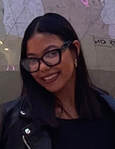 Crysta Garcia is a teaching artist born, raised, and based in New York City. As an educator, she has had the pleasure of working with Community Word Project, the Aspen Institute, WriteOn NYC, and other organizations that provide arts education to various school programs. She is a 2022 graduate of The New School’s Creative Writing Program, and now holds her MFA in poetry.  I’d heard of frogs, rats, but never this, at least not until they were set before us on the lab tables, ready for our exploration. We dissected fetal pigs in biology junior year of high school as part of the public-school curriculum. There was no option for an alternative assignment. I was no vegetarian, but the experience made me give up my weekly carnitas for a month. That week, I came to class suited up for surgery, or nuclear attack. I didn’t want to smell something I might not easily forget. The creatures looked like little pink dolls wrapped up tightly in their plastic wrapping. On the third day of dissection, my lab partner mistakenly cut into the large intestine, sending its contents soaring. Someone else in the class passed out. When we were finished, the remains were discarded. I couldn’t tell you what general knowledge requirement this fulfilled. To this day I still don’t quite understand the purpose. Were we supposed to learn something we couldn’t by textbook or simulation? What was it that cutting into flesh was supposed to teach us? Whatever the reason, it was lost on me. The animals had been bred for us to cut into and there was no great outrage. No one stood outside the building with signs in protest. No one offered up graphic images in hopes that it might stop us. The pigs were fetuses, almost fully developed, but nobody prayed over them. At the planned parenthood by my house, the church groups rage in droves. Life is sacred from the start. The protesters don’t know that they don’t perform abortions at that location, and perhaps they wouldn’t care. A billboard in my town notes the early development of eyes and toes, both of which the pigs had, too. The reasons why and when people choose to care are inconsistent. The reasons aren’t really reasoning at all.  Danielle Shorr (she/her) is an MFA alum and professor of disability rhetoric and creative writing at Chapman University. A finalist for the Diana Woods Memorial Prize in Creative Nonfiction and nominee for The Pushcart Prize in Creative Nonfiction and Best of the Net 2022, her work has appeared in Lunch Ticket, Driftwood Press, The Florida Review, The New Orleans Review, and others. Follow her on social media @danielleshorr 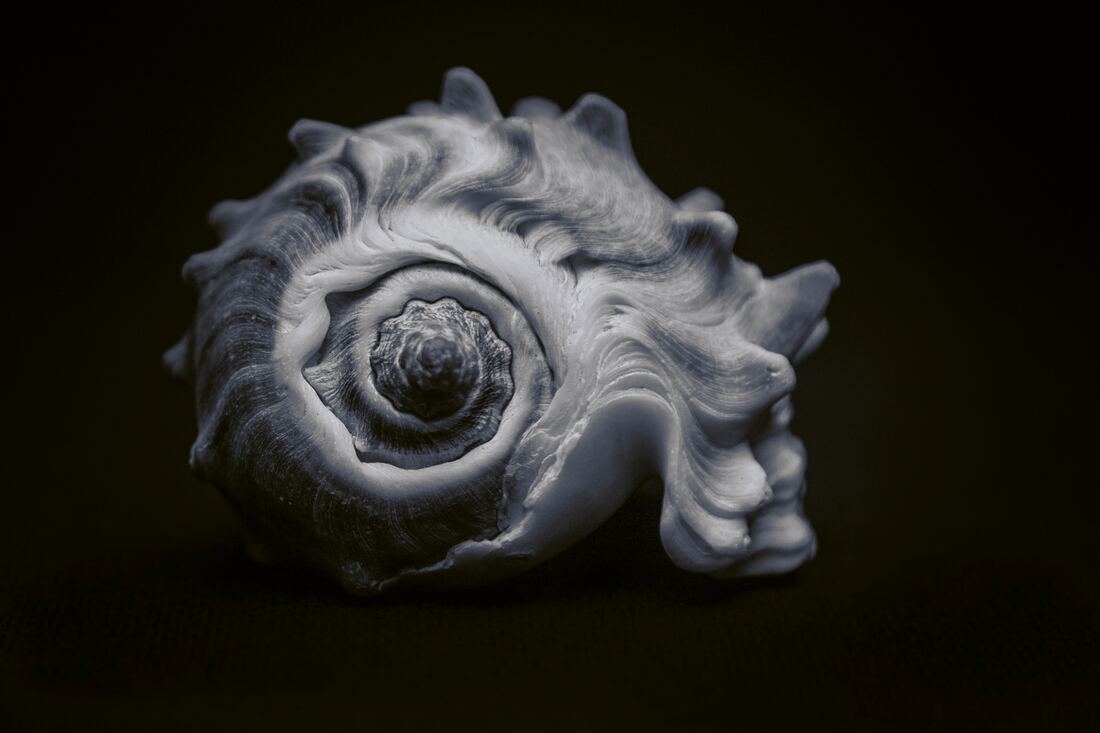 Photo by Brandon Jaramillo on Unsplash seven My feet are small enough to be swallowed by sand when I walk by the tide. We woke at 5:30 when light whispers sunrise. Face swollen like a raft, I shimmy sweatpants over my ankles and put on my polka-dotted blouse. Her ashes are held in an urn that is ornate because she loved ornate things like costume jewelry and impression glass and ceramic figurines. All her life she wanted to swim with the dolphins; feel water smooth against her body. So my uncle waded me into the water and we poured her slow into the waves; our tears dripping to the sea like rain and the water washing us with goodbye. eight My childhood was ruled by water that matted my hair and salted my stomach. No one has ever loved me like the sun on the Chesapeake Bay. Days that left me freckled and flushed for nights stroked with firefly butts. When we were young and violent, we used to rub their luminescence on our clothes and say “we’re glowing.” I liked being dyed different. On Sundays in Sam’s pool, we’d swim until our hair turned chlorine-aquamarine. To shimmer like mermaids, we stretched hair-ties around our ankles and rolled our bodies like fish. Our nails were pink like scales and goggles were glasses that stretched plastic walls into sea-kingdoms. twelve I’m craving ham & cheese sliders on a boat that smells of sunscreen and potato chips. Mayo is a luxury so we eat them dry while my body sinks into plastic chairs and I stare at jellyfish tentacles that remind me of cotton candy. Sand grits my fingernails while I search for sharks' teeth. Brackish water: my fountain of youth. I jump portside to let small waves lap my body. I jump portside to let small waves settle me silent and swallowed. fourteen Canoes crochet through weeds and foam and we become explorers. After eight pm we go braless and smoke wet weed that makes us gum-grin and giggle. We speak in riddles and skinny dip. Our mouths like vaults; each tooth a safe rooted in gums stuck to secrets and saliva. Our tongues lusting to speak half-truths, we avoid lockjaw by gossiping about our first blowjobs and how we can improve. Mascara drips below our eyes and makes us ominous in the dark but we’re too afraid to be barefaced. Wine coolers hidden in sweatshirts, we drink to: Miley Cyrus, summertime, and the flavor of fourteen. sixteen The first time a boy saw me naked was on the water’s edge. Ripples reflected midnight black like the sky and my nipples were hard from June’s breath. I eased in slow and once beside him, he held me bare like that. Our bodies compressed like a whole moon, I kissed his neck while the stars rained silent glitter around us. twenty-three I have been washed in pools and rivers and Atlantic blues. I have been salted and chlorinated and smoothed by riptide. My feet have grown big enough to sprint and I know I am not a mermaid. I am seaweed and river rock and muck of the bay. I am at the beach and a dolphin’s fin breaks the waves so I say hello to my grandmother and let her know my life is ruled by water, so one day I will join her. 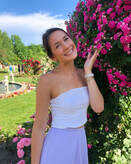 Katee's passion for writing and fascination for language has forever guided her path in life. Her work has been published in Colonnades Literary & Art Journal and the Mulberry Literary. Recently, she won the 2022 Harold Taylor Prize for her piece "August's Morning Breath," which can now be read on poets.org. Currently, she is based in the city of Boston while pursuing her MFA in poetry at the University of Massachusetts, Boston. this will bring you to your knees. A place where there is no language, because to pray is never to speak but to hold your palms open and hope for them to fill with what the world sees fit. And it is never a new tongue, however much you crave it, but sometimes it is the ridge of a collarbone. Slim, curving wrists. On your knees, you keep your eyes closed, and full is not the word you’re looking for, but flood comes close. You lean your head into the warm sway of another’s waist, bent-necked, and kiss the salt from their skin in solemn, methodic rows. They don’t speak, and neither do you, because your tongue is all you have and it has never been enough to explain that if god were a moment, it would be this moment. The one where you’re on your knees, hands flood-ing, heart shivering, head bowed to your lover’s stomach on the floor of their apartment while the oven timer goes off and off and off and neither of you moves to silence it because they’ve reached down, taken your face in their hands, gently pulled you up, deemed your tongue a not-useless thing. Sometimes you destroy what you love. You sign your name on the world around you. You mark it until every flower, its every petal, is stained with your name. The icy pink orchid is patterned with your voice like grainy lines of Morse. The birds wear your colors. You’re the first dawn trembling with red-gold light, the first word spoken inside the first voice, the stars’ slow movement eclipsed by your skin, the moon’s slick pattern of slanted light smearing the earth beneath you. You’re everywhere, and the world is too small for you. You’re everywhere, and you’re grasping onto the one thing you can crawl inside of. You write it down. Everywhere the earth fills up with naming like the cold scent from underneath the cedar limbs. You know each separate color, each tiny part, now that you’ve classified it, given it a tiny heart to beat. Still the earth keeps leaving you behind; it keeps replacing you. You’re buried or eroded by time’s slow sickle. The pattern of cruelty is to give you a creation that also removes you, how memory always repairs. Your efforts to make a deep impression goes unrewarded. The future won’t look at you with the same eyes or won’t look at you at all. Hannah Rodabaugh holds an MA from Miami University and an MFA from Naropa University. She is the author of three chapbooks, including We Don't Bury Our Dead When Our Dead Are Animals, a collection of ecological elegies. Her writing has appeared or is forthcoming in The Indianapolis Review, Berkeley Poetry Review, Camas Magazine, Horse Less Review, K’in Literary Journal, and elsewhere. She’s been an Artist-in-Residence for the Bureau of Land Management and the National Park Service. She teaches English at Boise State University and writing at The Cabin Idaho, Idaho’s only literary center. Her website is: www.hannahrodabaugh.com
|
FLASH GLASS: A MONTHLY PUBLICATION OF FLASH FICTION, PROSE POETRY, & MICRO ESSAYSCOVER IMAGE:
|
|
Glassworks is a publication of Rowan University's Master of Arts in Writing 260 Victoria Street • Glassboro, New Jersey 08028 [email protected] |
All Content on this Site (c) 2024 Glassworks
|


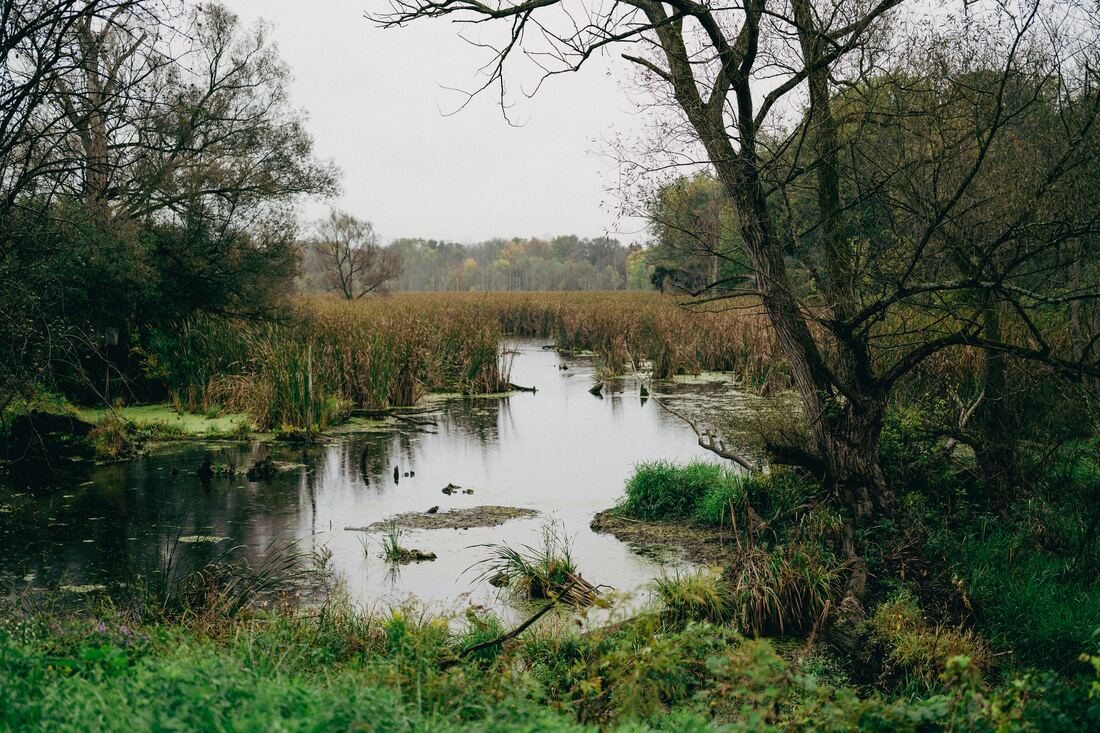
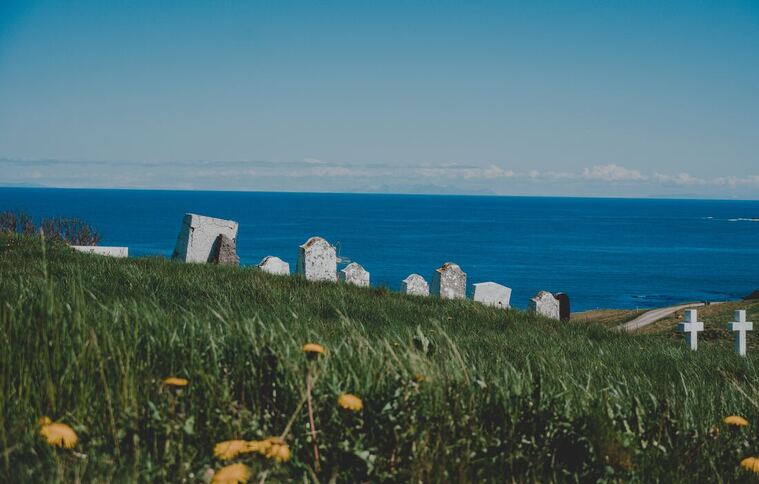


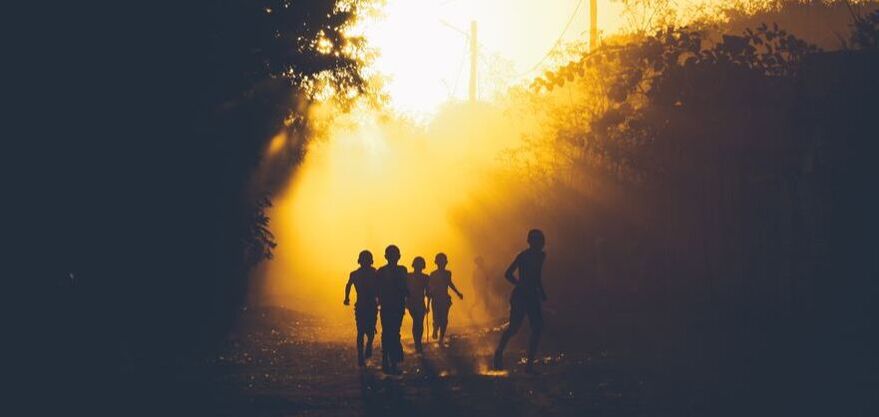

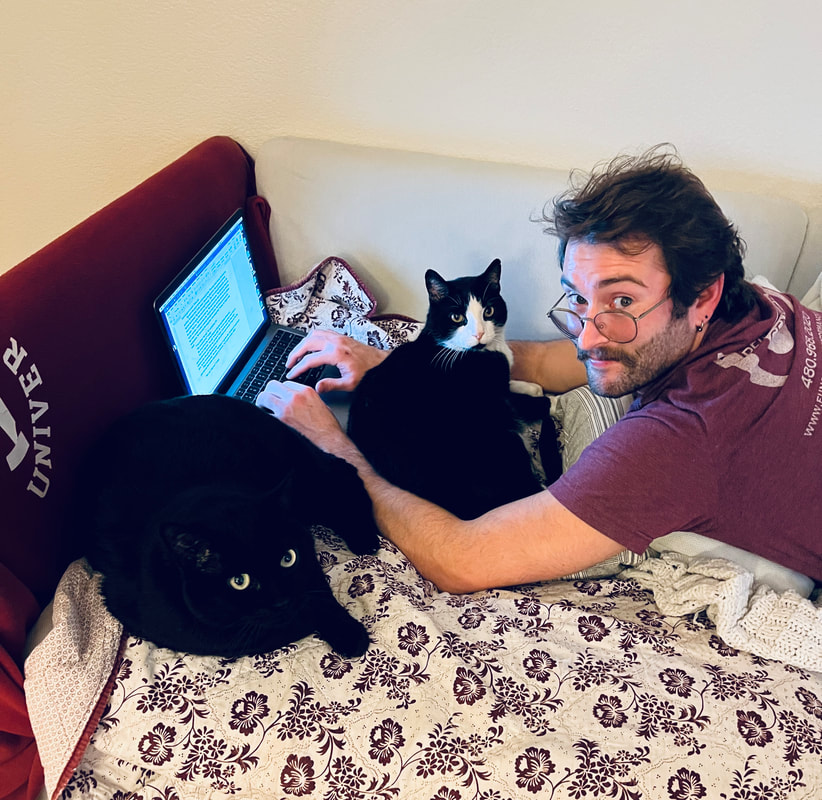
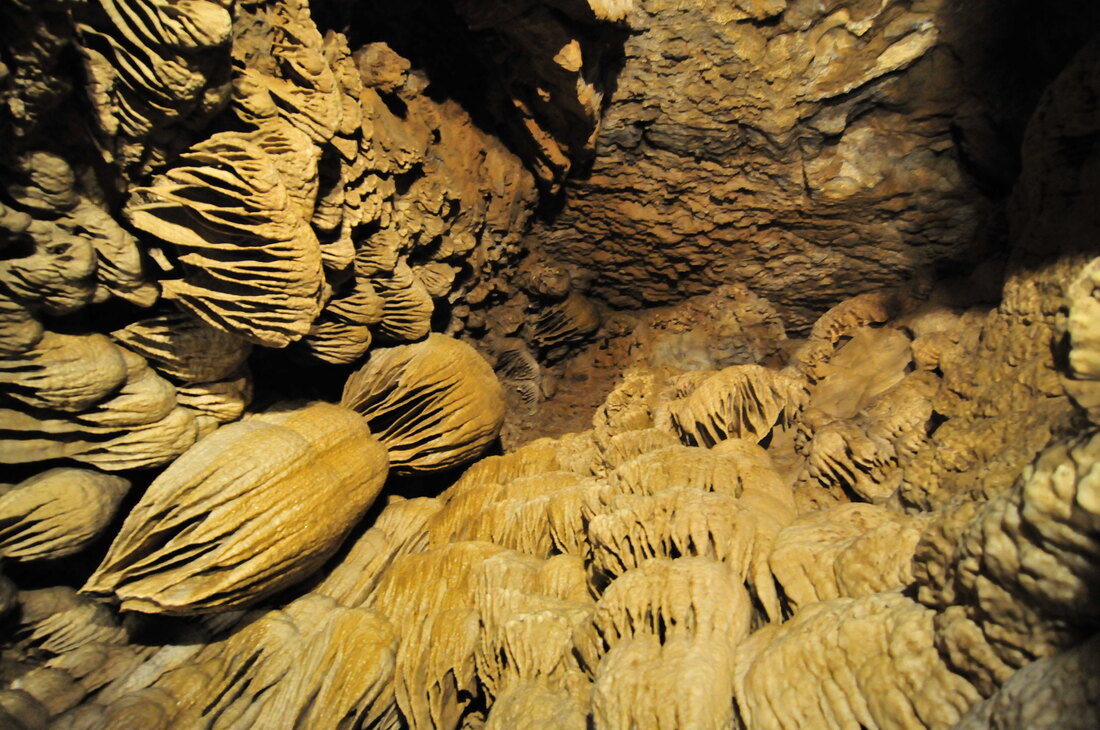
 RSS Feed
RSS Feed
